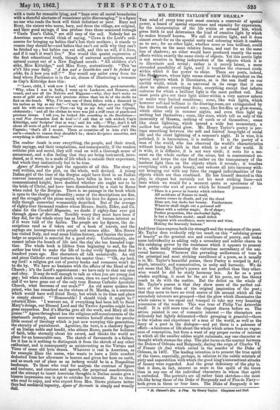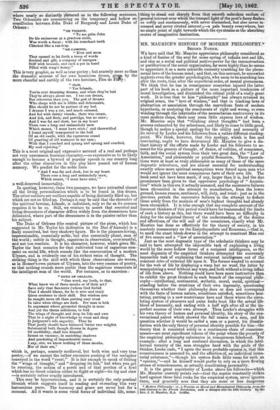MR. HENRY TAYLOR'g . NEW DRAMA.* THE mind of every true
poet must contain a reservoir of special power, a hoard of special experience and capacity for experience, for the interpretation of the life within or around him, which gives birth to and determines the kind of creative light by which he makes himself known. We call it creative light, and it does almost create for us the special unity and colouring which it enables us to see ; for no other light, whether more or less brilliant, could have shown us the same relative forms, and cast for us the same line of shadows; no other would have produced exactly the same effects within exactly the same circle of objects. Yet this poetic light is not creative in being independent of the objects which it is to illuminate and reveal ; rather is it merely latent, a mere shrouded possibility of light, until it touches the charmed circle within which it has power to shine. There are poets, indeed, like Shaapeare, whose light seems almost as little dependent on the special objects which it illuminates, as is the sun itself on our earthly world, which is so universal in its range that it can show us almost everything finite, everything except that infinite universe for which a brilliant light is the most perfect veil. But most poets give out their light either within a very narrow sphere or under very limited conditions; some, like wax lights, which however soft and brilliant in the drawing-room, are extinguished by the first breath of outward air; some, like fire-flies or glow-worms, which shine only in summer nights, and even then light up nothing but themselves ; some, like stars, which tell us only of the immensity of Heaven, nothing of earth or of themselves; some like sheet lightning, which spread a wide but momentary, a mellow but superficial glow. Mr. Henry Taylor's poetry is per- haps something between the soft and limited lamp-light of social i life and the sheet lightning of a summer's night. It is wise, it is polished, it is harmonious, it is mellow. It is the poetry of a man of the world, who has observed the world's characteristics without losing his faith in that which is not of the world. It is wide, it is diffusive, it is not very vivid; it rests for a mo- ment on the whole surface of the scene, but is concentrated no- where, and keeps the eye fixed rather on the transparency of the lambent light than on the objects which it reveals ; it touches everything with a pale beauty, and reduces all into harmony with- out bringing out with any force the rugged individualities of the objects which are thus combined. He has himself denoted in this play, in elegant but certainly not his most striking lines—not lines which °we would for a moment quote as specimens of his best poetry—the sort of power which he himself possesses :
"There is a power in beauty which subdues All accidents of Nature to itself, Aurora comes in clouds, and yet the cloud Dims not, but decks her beauty. Furthermore Whate'er shall single out a personal self Takes with a subtler magic. So of shape ; Perfect proportion, like unclouded light, Is but a faultless model ; small defect Conjoint with excellence, more moves and wins, Making the heavenly human."
And these lines express both the strength and the weakness of the poet. Mr. Taylor does evidently rely too much on this "subduing power of beauty" as the greatest aim and excellence of poetry, and looks upon individuality as adding only a secondary and subtler charm to this subduing power by the resistance which it appears to present to it, while really enhancing the victorious ascendancy of the uni- versal harmony. Wherever this pervading mellowness of tone is the principal and most striking excellence of a poem, as it usually is in Mr. Taylor's beautiful poems, there Poetry is merged in Art; depth, intensity, and concentration, in unity and harmony. We do not mean that Mr. Taylor's poems are less perfect than they other- wise would be did he study harmony less. As far as a poet studies anything, it must be the art of his poem, nor has theory much to do with the matter. But the defect on the whole of Mr. Taylor's poems is that they show more of the perfect cul- ture of the artist than of the original inspiration of the poet; that they seem to have no vivid centre of life around which all the secondary interests are grouped—that the glow which illuminates the whole canvas is too equal and tranquil to take any very haunting possession of the reader. This was true of Philip Van Artevelde itself. It is still more true of the elegant drama before us. The action painted is one of romantic interest — the characters are delicately but lightly delineated—their grouping is graceful—there is the wisdom and experience of a man of the world, as well as the fancy of a poet in the dialogue—and yet there is a paleness of effect—a faintness of life about the whole which arises from no vague- ness of conception, but from a want of any proper vortex of interest in which all the smaller eddies might culminate, any one character or thought which stamps the play. The plot turns on the contest between the Dukes of Orleans and Burgundy, daring the reign of Charles VI. of France (k fou) which ended in the murder of the Duke of Orleans, in 1407. The leading intention is to present the true spirit of the times, especially, perhaps, in relation to the subtle mixture of piety and superstition with which the good king's intermittent attacks of lunacy were regarded. And the great deficiency of the play is, that it does, in fact, interest us more in the spirit of the times than in any one of the individual characters in whom that spirit is embodied. The portraits are all rather faint sketches—the most life-like being those of the Dake of Burgundy and of Flos de Flavy- both given in three or four lines. The Duke of Burgundy is no- • St. Ckment's Ere. A Play. By Henry Taylor. Chapman and Hall.
where nearly so distinctly pictured as in the following sentences. Two Orleanists are commenting on the temporary and hollow re- conciliation between John Duke of Burgundy and Louis Duke of Orleans :
"DE VIEEZON.
"To see grim John Do his endeavour at a gracious smile, Was worth a ducat ; with his trenchant teeth Clinched like a rat-trap.
"DE CASSINEL.
" Ever and anon They opened to let forth a troop of words Scented and gilt, a company of masques Stiff with brocade, and each a pot in hand Filled with wasp's honey."
This is very graphic, as well as true poetry ; but scarcely more so than the dramatic account of her own humorous dream, g►mp. by the more cheerful and earthly of the two heroines, Flos de Fly :
" FLO&
" Yes Iolande„
You're ever dreaming dreams, and when they're bad They're always about me. I too can dream, But otherwise than you. The god of dreams Who sleeps with me is blithe and debonnaire, Else should he not be partner of my bed.
I dreamt I was a cat, and much caressed, And fed with dainty viands; there was cream, And fish, and flesh, and porridge, but no mice ; And I was fat and sleek, but in my heart There rose a long and melancholy mew
Which meant, ' I must have mice' and therewithal I found myself transported to the hall
Of an old castle, with the rapturous sound Of gnawing of old wainscot in my ears ; With that I couched and sprang and sprang and coached, My soul rejoicing."
This is a most original and expressive account of a real and perhaps not very uncommon feminine character —so expressive as to be likely enough to become a byword of popular speech in our country long after the other characters in this play have passed out of human memory. We predict for the noble lines
"And I was fat and sleek, but in my heart There rose a long and melancholy mew, Which meant, I must have mice,' "
a well-deserved immortality.
In quoting, however, these two passages, we have extracted almost all the living /personification which is to be found in this drama. The other outlines are outlines capable of being distinctly filled up, but which are not so filled up. Perhaps it may be said that the character of the spiritual heroine, Iolande, is indistinct, only so far as its essence requires it to be so. Still, we venture to assert that essential and living dreaminess of character differs widely from the dreaminess here delineated, where part of the dreaminess is in the painter rather than his subject.
The Duke of Orleans (the central picture of the piece, which has suggested to Mr. Taylor his dedication to the Due d'Anmale) is a finely conceived, but very shadowy figure. He is the pleasure-loving, impressionable, essentially noble, but also essentially pliant, man of the world; subtle in thought, sagacious in observation, over-trustful, and not too resolute. It is his character, however, which gives Mr. Taylor the best occasion for that cultivated tone of sagacious com- ment on social life, which sounds like the conversation of a modern Ulysses, and is evidently one of his richest veins of thought. The striking thing is the skill with which these observations are woven, as in Homer's own picture of Ulysses, into the very essence of poetry, so that nothing sounds more poetic than the sagacious comments of the intelligent man of the world. For instance, as to exorcism :
" mars or ORLEANS.
" One word, my lords, to that.
What know we of these monks or of their art?
Save only that Sanxerre (whom God forbid That I should blame, for he is wise and true) Gives credence to their skill. But wisdom errs In nought more oft than putting easy trust In tales when things are dark. For man is loth In argument where grounded thought is none And yet the theme solicitous, to fold
The wings of thought and drop its lids and own
That in a night of knowledge to roost and sleep Is judgment's sole sagacity. Thus he That justly should have balanced 'twixt two weights Substantial both though diverse in degree Of credibility, shall lose himself, Intent on vacancy, in snatching shadows And pondering of imponderable motes.
I say, sirs, we know nothing of these monks,
Nor of their art,"
which is,perhaps, scarcely mediteval, but both wise and very true poetry,—ii we except the rather excessive pushing of the metaphor conveyed in the word " roost." It is fair enough to speak of folding the "wings of thought," and "dropping its lids," but when you get to roosting, the notion of a perch and of that portion of a fowl which has no direct relation either to flight or sight—its leg and claw —is certainly rather cruelly introduced.
This may be hypercriticism, and it is certainly the only poetical blemish which suggests itself in reading and re-reading this very harmonious poem. The harmony and grace are never lost for a moment. All it wants is some vivid focus of individual life, some- thing to stand out sharply from that smooth unbroken surface of general interest over which the tranquil light of the poet's fancy flashes so softly and continuously, with never diminished, but also never in- creased and never riveted interest ;—a pale beauty everywhere, but no single point of sight towards which the eye strains as the absorbing centre of imaginative fascination.































 Previous page
Previous page